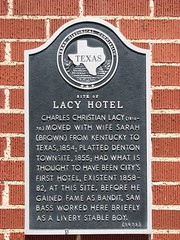

Sam Bass
(1851-1878)
Died aged c. 27
Wikidata WikipediaSam Bass (July 21, 1851 ‒ July 21, 1878) was a 19th-century American train robber, outlaw, and outlaw gang leader. Notably, he was a member of a gang of six that robbed a Union Pacific train in Nebraska of $60,000 in newly minted gold from San Francisco, California. To date, this was the biggest train robbery ever committed in the USA. He died as a result of wounds sustained in a gun battle with law enforcement officers.
DbPedia
Commemorated on 8 plaques
Texas Historical Marker #02279
Gregg Ranch. Darius Gregg (1804-70), who came to Texas from Tennessee in 1827, and fought in the Texas War for Independence, accumulated about 20,000 acres in this area in the early 1850s. Gregg, a surveyor and Houston Realtor, spent several summers here before his death. His son, William Bowen Gregg (1849-89), moved from Houston and operated the ranch in 1870s and early 1880s. Notorious outlaw Sam Bass worked on the ranch, and a frequent summer visitor was Robert Swift, of the well known meat packing family. Of the original ranch, 750 acres are still owned by a Gregg heir. (1973) #2279
?, Denton, TX, United States where they worked
Texas Historical Marker #02431
Hell's Half Acre. A notorious red light district known as Hell's Half Acre developed in this section of Fort Worth after the arrival of the Texas and Pacific Railway in 1876 launched a local economic boom. Fort Worth was soon the favorite destination for hundreds of cowboys, buffalo hunters, railroad workers, and freighters eager to wash off the trail dust and enjoy themselves. To meet the demand, a large number of saloons, dance halls, gambling houses, and bordellos opened between the Courthouse Square and the railroad depot. Illegal activities in Hell's Half Acre were tolerated by city officials because of their importance to the town's economy. The district prospered in the 1880s and added to Fort Worth's growing reputation as a rowdy frontier town. Famous gamblers Luke Short, Bat Masterson and Wyatt Earp and outlaws Sam Bass, Eugene Bunch, Butch Cassidy and the Sundance Kid are known to have spent time in Hell's Half Acre. A 1906 newspaper headline calling the district Fort Worth's den of sin and refuge of criminals was representative of periodic efforts to clean up the district. These efforts proved unsuccessful until Army officials at Camp Bowie, established here during World War I, helped local officials shut the district down. (1993) #2431
12th & Houston, Fort Worth, TX, United States where they was
Texas Historical Marker #03700
Old Campsite of Jesse and Frank James. Famous western frontier outlaws, who had many Texas hideouts along a line from the Rio Grande to the Red River. The camps - extending into Missouri, their home state - were used for hiding stolen horses until posses could be thrown off the trail. The campsites were sometimes known to scattered settlers, who feared or befriended the bandits. Also, friendly with the James brothers (and also operating sometimes in Texas) were fellow Missouri outlaws, Cole Younger and "Bandit Queen" Belle Starr. This was an era of widespread lawlessness in Texas. Billy the Kid roamed into West Texas. The Daltons, John Wesley Hardin, Cullen Baker, Bill Longley, Sam Bass and many others found it easy to kill and rob and then hid in wild areas where they were beyond the reach of local officers, and food was plentiful. After reconstruction ended in 1874, Texas Rangers were reorganized, to restore respect for the law. Given special powers, in 1889-90 they arrested 579 wanted men (including 76 alleged murders). Jesse James and some other notorious badmen by then were dead. Frank, reformed, worked as a salesman in Dallas, Paris, and other Texas towns. #3700
US 380, E of Decatur, Decatur, TX, United States where they hid
Texas Historical Marker #06591
Sam Bass Train Robbery. Sam Bass -- with Seab Barnes, Hank Underwood, "Arkansas" Johnson, and Frank Jackson -- held up a Texas & Pacific train here, April 10, 1878. They took $152, but missed hidden shipment of $30,000. In planning a bank robbery 3 months later, Bass was fatally shot by rangers. #6591
?, Mesquite, TX, United States where they robbed
Texas Historical Marker #06957
Bolivar, Townsite of. Named indirectly for Simon Bolivar, South American statesman, general and patriot. It might have been called "New Prospect," but for a mug of rum. When town was founded in 1852, a man who had settled here from Bolivar, Tenn., wanted to name the community in honor of his hometown. But a preacher-doctor insisted that it be named New Prospect. An election was called to settle the matter and the Tennessean exchanged mugs of rum for votes, Bolivar won. During the 1800s, Bolivar was the westernmost fort in Denton County and the first settlement west of Collin County. Two stagecoach lines changed horses here. The town thrived and could count three hotels, several stores, a gin, a flour mill, a sawmill, a blacksmith shop, a saloon, a church and a school. It was here that the Texas cattle trail joined the Jesse Chisholm Trail, but it was John Chisum, Texas cattle baron, who had herds here and furnished beef to the Confederacy during the Civil War. Bolivar and the surrounding area were havens for Sam Bass and his men. Two Bolivar men were jailed in 1890 for harboring notorious marauders. Many early settlers (whose descendants still live here) played important roles in development of county. #6957
?, Denton, TX, United States where they hid
Texas Historical Marker #06966
Site of Lacy Hotel. Charles Christian Lacy (1816 - 70) moved with wife Sarah (Brown) from Kentucky to Texas, 1854; platted Denton townsite, 1855; had what is thought to have been city's first hotel, existent 1858-82, at this site. Before he gained fame as bandit, Sam Bass worked here briefly as a livery stable boy. #6966
102 W. Oak, Denton, TX, United States where they worked
Texas Historical Marker #09031
Sam Bass' Death Site. An uneducated Indiana orphan who drifted to Texas as a youth, Sam Bass won fame racing his swift "Denton Mare," gambling, and robbing trains. A rich haul in Nebraska was followed by months of reckless spending. Bass liked to shower gold on people who fed or harbored him while he eluded law officers. In July 1878 he came to Round Rock to rob a bank, and was shot by Texas Rangers. Gallant to the last, refusing to name guilty partners, he became a hero to 19th century balladeers. His celebrated grave is situated in old Round Rock Cemetery. #9031
W. Main St. at Round Rock Ave., Round Rock, TX, United States where they died (1878)
Texas Historical Marker #09331
Round Rock Cemetery. Established in the early 1850s in what is now known as Old Round Rock, this cemetery is the burial ground of many area pioneers and outstanding Round Rock citizens. The oldest legible tombstone, which marks the burial site of 11-year-old Angeline Scott, bears the year 1851, although there are many unmarked graves that could date from before that time. One-half acre in the northwest part of the 4.5-acre cemetery was used as a burial ground for slaves and freedmen during the nineteenth century. Numerous war veterans are buried here, as is bank robber and outlaw Sam Bass, who died July 21, 1878, two days after being shot by Texas Rangers in Round Rock. Other buried in the cemetery include G. T. Cole, one of the few area eye doctors; Round Rock broom factory owner Sam Landrum; stonemason John H. Gray; Round Rock Presbyterian Church minister John Hudson; and Methodist circuit rider J. W. Ledbetter. One unusual tombstone, which marks the gravesite of Mary Ann Lavender, bears the date February 30, 1870. The Round Rock Cemetery, which contains more than 2,000 graves, is a visible reminder of the early history of this part of Williamson County. The burial ground is cared for by the Round Rock Cemetery Association. (1983) #9331
Sam Bass Rd, Round Rock, TX, United States where they was buried (1878)




.jpg?width=250)